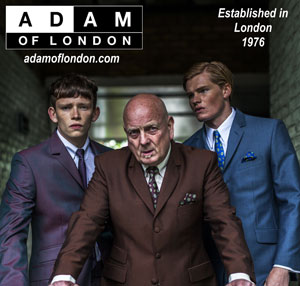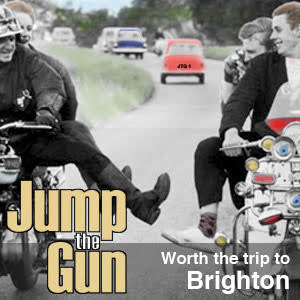
The Scenester checks out this very rare screening of a cult classic.
Very little time elapsed between the NFT’s May calendar landing on my doormat and me booking the tickets for this rare-as-hen’s-teeth showing of The Wednesday Play from January 1970, and it probably goes without saying that its presentation came courtesy of Vic and Will Flipside.
As the day approached, even my long-suffering workmates noticed I seemed less like a grizzly bear with a hangover, and more like a normal human being. By the evening of Wednesday 19th, pumped to the max with anticipation, I met Mme. Scenester on the ‘sunny’ South Bank, bearing wine and sandwiches to pass the couple of hours we had before the screening. Well attended, not least by some well-known Mods of my acquaintance, we were delighted to learn that a few clips of Jools, Brian Auger & The Trinity would be accompanying the main feature. Vic and Will’s charmingly shambolic intro revealed that a further treat was in store, a Q&A with producer Desmond McCarthy, but before we could catch our breath, we were into the famous Top of the Pops clip of Jools, Brian Augur & the Trinity performing ‘This Wheels on Fire’. The survival of this remarkable clip from the Grim Wiper’s attentions is nothing short of miraculous, bearing in mind the BBC’s attitude to these very individual cultural artefacts during the last few decades. Perhaps just as amazing was a clip of Jools & Co from the David Frost Show, both black & white and totally priceless. The assured sang-froid performance of ‘This Wheel’s On Fire’ contrasted with the slightly ramshackle Frost clip, but no-one was complaining.
Season of the Witch would be Jools’ acting debut, (and her swansong in that discipline?) as she puts up a touchingly believable show as Meredith, a young typist (she had worked as a typist before her singing career took off) who decides to leave the parental home and bum around Sussex and Cornwall for as long as it takes her to get bored.
Glynn Edwards (Minder’s Dave) and Fanny Carby’s strong portrayals of Meredith’s concerned but outraged parents, who criticise every aspect of her lifestyle, personality and appearance, are particularly poignant. In these days of ‘geeky’ fashions, it is particularly easy to forget just how conformist English society once was, when a man growing his hair to touch his ears, or wearing brown suede shoes would risk accusations about his sexuality. Or a girl who adopted anything other than a smart, businesslike style of hair and clothing, let alone some of the ‘dykier’ fashions of the late 60s that Jools was often seen in, would risk complete social opprobrium.
Anyone who regularly reads my ramblings will know that I am more than a little fond of the coastal town of Brighton (city now, but I still think of it as a town) and can well imagine the thrill I felt when the storyline placed Meredith on a train leaving the then-shabby interior of Victoria Station, bound for the jewel of the South Coast. The film’s docu-drama style ensured that this was no tourist film, but instead took us to some of the less familiar places in town, notably the Arches Project, a sort of drop-in centre for the young and homeless, who would normally have congregated on the beach. The Mayor and burghers, who would arrange for the shingle beach to be sprayed with water at night, to prevent anyone sleeping there, did not appreciate their presence. The Project had laudable aims, and it’s here that Jools, sorry Meredith, meets the genuinely concerned social workers (real ones, not actors) and more significantly, a couple of rudderless ‘beats’ (not ‘hippies’) played with considerable brio by none other than Paul Nicholas and Robert Powell. Nicholas, by then, was already making a name for himself, having played in the stage version of ‘Hair’, although Robert Powell’s role as a Roman-baiting charismatic Nazarene was still a few years away. They take up a particularly well appointed, but seriously dilapidated Georgian house with Meredith, and their ménage-a-trois reminded me of ‘Jules et Jim’, and I doubt that the oblique reference was unintended. Arguments over money (Meredith is the breadwinner, unsurprisingly) and trouble with the Law inevitably follow, as Meredith gets caught at a ‘demo’ with someone else’s hash, and her treatment at the hands of the police mirrors the typical experience of the under-represented, or plain working class, kid-in-trouble of the period.
There is a lot to like about this docu-drama, especially the commissioned music and the honest performances from actors and non-actors alike. The special treat of the evening was definitely the appearance of director Desmond McCarthy. Desmond told us a little about his prior background in TV shows like ‘Coronation Street’, passing on to the making of ‘Season of the Witch’, which he obviously enjoyed. He began by unconsciously answering my intended first question, about how much of what we saw was strict adherence to script, and how much improvisation. The film turned out to be a joint effort between Desmond and Johnny Byrne, and whilst almost all was strictly scripted, the dialogues were of such high quality and honesty, that they could have been taken for being completely spontaneous. The grumbles of the older generation, which form such an important part of the script, were, we learnt, scripted from life, people speaking to camera on vox-pop type TV shows about inter-generational tension. A quick amendment to my intended question resulted in a little more information about this true to life script, and it wasn’t long before the name Jenny Fabian cropped up, herself the subject of joint scriptwriter Johnny Byrne’s famously forthright book, ‘Groupie’, and a bit-player in the Arches Project sequence of the film. I felt 100% in agreement with Will & Vic that the sooner this gem of a film is out on DVD (or better still, repeated on TV?) the better, and who knows, maybe the BBC have a few more Wednesday Plays in the archive, that deserve a further and timely showing?
Did I mention I was a fan of Jools?









Put me down for the DVD. I was in lust with the gorgeous Jools in the 60’s, LOL. Seriously, sounds like a good insight into the mod scene.